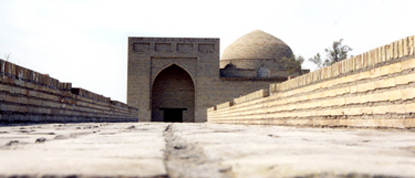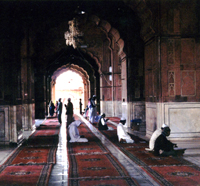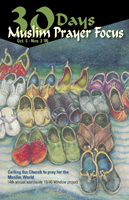|
|

|
|
IN THE SHADOWS OF RAMADAN
By Steve Goddard
My daughter married in May, after months of work by my wife, daughter, and many others. I took heed to the adage “weddings organize themselves” and tried to stay out of the way. While watching from the sidelines, I heard some interesting comments. “It’s an evening wedding, so you can’t…” “We have to invite them because…” “I have something borrowed but nothing…”
Do you observe a common denominator? Tradition. For most of us, the way tradition impacts our lives depends on our personalities and the particular tradition in question.
However, for nearly a billion people in our world, tradition dictates their lives. They are Muslims. Whether from Africa, Southeast Asia, or the Middle East, they adhere to the same tradition handed down from Mohammed 1,400 years ago. While there are cultural variations, the same basic traditions form the core of their lives, both cultural and religious. The Filipino Muslim, the Iraqi Muslim, and every other type of Muslim are doctrinally one.
This is well illustrated by the observance of Ramadan—a month of fasting and remembrance dating back to the seventh century A.D. Muslims believe the angel Gabriel began to reveal God’s message to Mohammed at that time. Eventually the message was codified into what we know as the Quran.
In the second chapter (surah) of the Quran, the reader finds specific instructions on how to observe this holy month. Between dawn and dusk—literally between the time a black thread can and cannot be distinguished from a white one—Muslims are to refrain from food, water, sex, and tobacco. Instead, they are instructed to engage in prayer, repentance, hearing the Quran, and giving to the poor.
Sounds almost biblical, doesn’t it? Until you realize these activities are not merely encouraged; they are mandated. With the exception of those who are traveling or sick, every Muslim is expected to fulfill every requirement of Ramadan—to follow tradition to the letter. And many do.
But why? For a very small number, the answer is devotion, affection, even love. They live out, during Ramadan, their understanding of the principle Christians are taught in 1 John 5:3. Love for God is demonstrated by keeping His commands without considering them a burden. These dedicated Muslims fast, pray, and give because they love god, though in a way far different than what we know as Christians.
For the vast majority of Muslims, however, Ramadan is viewed simply as a weighty obligation. Yes, it serves a noble purpose, but it also highlights the hopelessness they feel about a capricious god who, on a whim, can send even the most faithful servant to Hell. In practical terms, the observance of Ramadan is no different than Christmas to many “Christians”—an annual cultural event shared by the entire community.

Consider the food issue. A month-long fast sounds tough to manage, doesn’t it? In reality, though, it’s not a true fast, only a re-arranged meal schedule. The Quran itself (surah 2) instructs Muslims to eat and drink each day of the fast until the time it is possible to tell one thread from another. Common practice is to eat one meal just prior to sunrise and another after sunset.
I’m not implying that Muslims make no sacrifices during Ramadan. It does take some measure of discipline and devotion to change usual patterns of behavior. But there is something intrinsically wrong with the mechanics and motivation behind the observance of Ramadan. Muslim scholar, Abul A’la Mawdudi, said in his book Towards Understanding Islam that by fasting during this holy month Muslims “proclaim the supremacy of the law of God…to make our life…one of true subservience to God’s will…to bring into the open the true equality of men…and create feelings of love and brotherhood among them.” In my opinion, the tradition accomplishes none of those things. It has failed to be a beacon and has, instead, become a prison.
What should we, as followers of Christ, do when we see Muslims across the street and around the world participate in Ramadan?
Forget Your Feelings
Forget how you feel. It is not unusual to experience anger, fear, or contempt toward Islam and those who follow it. We must remember that emotions also can become a prison, locking us into patterns of thought and behavior similar to those who disgust us.

Pray With Power
Pray. The Quran tells the reader to fast so God can be magnified. Let’s pray that Muslims by the thousands would see God the Son magnified.
Live Your Life
Live. Let your daily walk with Christ shine the light of truth into the lives of your Muslim acquaintances so the caricature of truth they cling to crumbles before Him who is Truth.
In case you are wondering, my daughter had her old and new, borrowed and blue on her big day. The tradition lived on and perhaps rightly so. But some traditions must end because they’ve become more than jailers; they are executioners. During this Ramadan season, may God use us to help those awaiting death move toward the Door to Life.
Steve Goddard is the training coordinator for Servant Group International, a Nashville-based mission agency working among Muslims in the U.S. and abroad.
|
------------------------------------------------------------------------
QUICK FACTS ABOUT RAMADAN
-
2005 dates are Oct 5—Nov 3
-
Based on the lunar cycle, Ramadan is
the ninth month and begins with the sighting of the new moon.
-
Actual dates vary, depending on location
-
Last 10 days are considered especially blessed
-
The 27th night is the “Night of Power”
-
Ramadan ends with a celebration and corporate prayer

30 Days Muslim Prayer Focus
Would you like to . . .
-
Learn more about Islam
-
Intercede for specific Islamic people groups
-
Understand how to pray for Muslims?
If so, Use the 30 Days Muslim Prayer Focus. Designed to use during Ramadan, this wonderful guide can also be used anytime.
Order your copies today: Free Will
Baptist International Missions
PO Box 5002
Antioch, TN 37011-5002
(877) 767-7736
|

